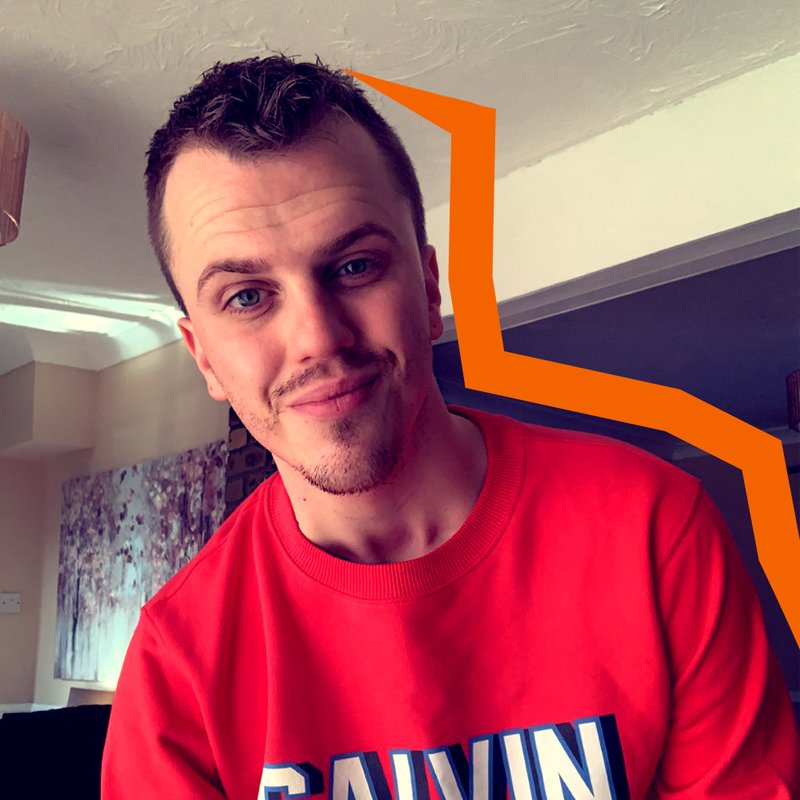"We haven't had enough diverse body representation of gay men."

At sixteen years old, Chris Hayter’s world was turned upside down.
His parents separated and his sister left home to start university. A once bustling household now felt eerily empty, and Chris struggled to pick up the pieces.
“Everyone was going through their own problems,” he recalls, “so I decided to keep mine to myself”. A month later, the purging behaviour began.
In retrospect, and after three years of therapy, Chris recognises that bingeing, purging and restricting became his comfort blanket. Something he could rely on, to process the loss and anxiety he was experiencing.
By the start of sixth form, the eating disorder had taken a firm grip and the physical symptoms were visible. While people noticed, he “mostly managed to fly under the radar” he says, “because [he] was a man”.
This suited Chris. He wasn’t ready to talk about it, so if anyone mentioned his changing appearance or worrying behaviour, he’d simply lie.
He’d tell loved ones he was on a health kick. That there was nothing to worry about. And no-one probed him further.
This is what makes Chris’ story an important example of gender bias within eating disorders. Because someone close to Chris had also struggled with anorexia, but unlike Chris, she was a woman. And unlike Chris, she quickly received the support she deserved to fully recover.
Despite having a large support network, which included friends, family and loving partner, Chris found it difficult to open up to them.
“No matter how trustworthy the person is, no matter how comfortable you are around them, no matter how much they’ve shared with you…it can feel physically debilitating to ask for support.” Through a combination of fear, culture and learned behaviour, Chris couldn’t talk about his mental health — and no-one challenged it.
Especially, Chris adds, because he is a gay man. The toxic stereotypes that suggest it’s normal for gay men to care about their appearance or be at the gym all day and night, means Chris’s inner circle didn’t see his behaviour as extreme. In fact it seemed normal.
So 13 years after his parents divorced, Chris was still struggling alone, without treatment. He struggles to verbalise the impact that had on him, but there’s one thing he’s clear on: the eating disorder hindered his development.
Chris didn’t learn to drive. He didn’t go to university (at least until much later). And he didn’t engage with anything that could’ve exposed his eating disorder.
It took a global pandemic, a particularly painful relapse and the encouragement of a loving partner, to get Chris an appointment with his GP — and the specialist eating disorder support he so deserved.
Almost three years later, Chris has come a long way.
For starters, he’s no longer purging. “The physical changes are encouraging” he notes. “I’ve always had mouth ulcers, to the point where I once had nine at the same time. And I don’t get them anymore — or the bloating.”
Mentally, he’s also a different person. He describes the eating disorder voice as a pop-up, which tells him what to do. But he no longer listens to it, in fact he tries to close the pop up. “I never would’ve been able to do that four years ago,” he explains, “but the treatment I’ve had has been groundbreaking.”
Groundbreaking, in the sense that he now understands the eating disorder, and is therefore able to verbalise it. To get it out there and talk to others about it. Something which, as a man, he had previously found difficult.
It’s a testament to Chris’ strength and perseverance that he’s also recently graduated from the Open University, with a degree in English Literature and Creative Writing. He did so while working full time and focussing on recovery.
And while he once just dreamed of being happy, today Chris’ goals are more ambitious. He wants to do a masters. He wants to find his dream job. And he’d like to have a family someday.
Things aren’t perfect, and he’s not yet fully recovered. But his attitude, understanding and strength leave us with little doubt he soon will be.
Any amount you can give, no matter how small, helps us bust toxic stereotypes and reach more men like Chris.